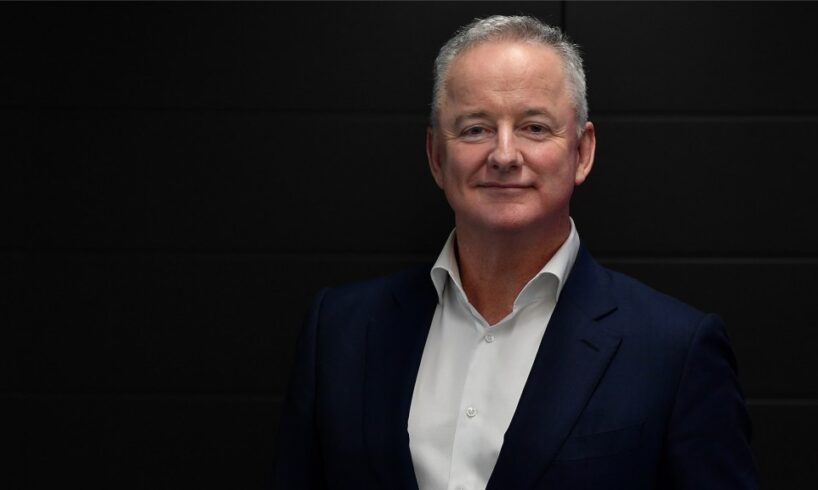
ABC managing director Hugh Marks held a roundtable of the nation’s media reporters to pitch his plan for the direction of the national broadcaster, in what appears to be the first step in Marks’ attempt to define his time in the office.
The meeting was held in a room named for former politician and ABC chair Neville Bonner, the first Aboriginal person to become a member of parliament, and attendees were fed a selection of sandwiches from Sydney cafe and catering enterprise The Grounds.
In the room was Marks, ABC head of entertainment Jennifer Collins, editorial director Gavin Fang, director of audio Ben Latimer and news director Justin Stevens. Also in attendance was ABC head of communications Freya Campbell, for whom the meeting was also an introduction of sorts to many in the room, having recently taken over from Nick Leys, who left Aunty earlier this year after a decade in the role.
Marks addressed the room for 15 minutes as the session began, without consulting any notes, telling media he wanted to make the ABC “the best place for people to work” and reiterating many of the key themes of his recent town hall address to staff. He articulated the ABC’s desire to move towards a simplified “three product strategy”, centring iview, ABC Listen and News Digital (its online news content).
Related Article Block Placeholder
Article ID: 1215832
“That also means we will simplify the homepage. At the moment, we sort of operate two homepages. We will be one front door and the front door will be fundamentally driven by news as its main function.” The ABC News website is the top-ranking digital news brand in the country, and has been consistently since December 2024, which is the last time it lost out to news.com.au.
Independent. Irreverent. In your inbox
Get the headlines they don’t want you to read. Sign up to Crikey’s free newsletters for fearless reporting, sharp analysis, and a touch of chaos
By continuing, you agree to our Terms & Conditions and Privacy Policy.
Asked by Crikey about the “clarity” given to ABC board members in the aftermath of the Antoinette Lattouf saga, Marks said that when he arrived at the organisation, he “could see the impact of inconsistent management structure on the work”.
“I wanted all of our teams being able to focus every day on their work without unnecessary distraction or lack of clarity of line of responsibility.
“It was very clear to me early on that I needed to be really firm in making sure that the right lines of reporting were in place, and that they would be respected … Kim (Williams, chair of the ABC board) is in absolute furious agreement with me on that.
“I’m constantly vigilant to make sure that is respected and the people around the table have the space to do their work well, and how important that that is for the organisation and all its staff — not just my team — they all need to feel that and hopefully that’s a culture shift that I’ve been able to achieve early on.”
Asked by The Australian Financial Review’s Sam Buckingham-Jones about whether the ABC had a new directive to settle legal cases faster in respect of the blow-out costs of the Lattouf matter, Marks said that in future the ABC would seek to find resolutions that were both more expedient and cheaper.
“We’ll always make errors — all media organisations do that,” Marks said.
“We own it and act on that and seek to fix that very early on, so hopefully we don’t end up in long, expensive litigation. We’ve had that chat as a team — everybody’s on board with that as a philosophy … you’ll have to wait and see whether we end up in another long, complicated case, but I’d like to think if we do, it’ll be for the right reasons.”
The question of the rationale for the demise of panel discussion show Q+A, axed earlier this year after nearly two decades on air, was also raised by Guardian Australia’s Amanda Meade. At its peak, the program had more than half a million viewers and was highly influential, dictating the week’s agenda in Australian politics.
“When it launched, [it was] community-driven, agenda journalism effectively, or commentary or debate. And I think it was brilliant. I think it had stopped being brilliant for that purpose.”
“We will come up with something that won’t be Q+A, but you’ll recognise it as being of that same genre,” he said.
News boss Justin Stevens added that when Q+A was conceived, it was reflective of a “moment in time”.
Related Article Block Placeholder
Article ID: 1213673
“Twitter was in its infancy, and it was a constructive place where you could have robust debate and disagreement without people burrowing into their own siloed worldview … what was innovative, really, was the immediacy of that as a dual-screen experience for the public. Increasingly since then, unfortunately, we all saw X go massively backwards and it is not a constructive forum for civil, public-square debate.
“We must always be in the town square. We must always have the ability for the public to exchange with those in positions of power. The question is, what is the innovative form of that today?”
Also discussed at length was the ABC’s role in commissioning creative content. Entertainment head Jennifer Collins said that the “big change for us with entertainment is around original formats”.
“We’ve publicly stated that we will invest in original formats, and that’s about preferencing those original formats where we can really support producers to have their own IP and really help develop shows and hopefully export those shows to the world.”
Children’s television leviathan Bluey, naturally, was the subject of consistent reference, but Meade pointed out that the international distribution rights for what Marks called “the biggest television show in America” were held by the BBC.
“In hindsight of, course, it would have been better if we’d made the investment in Bluey that the BBC made at the time,” Marks admitted.
“I’ve been in this game a long time. You don’t know [what’s going to be a hit] when it’s a pitch, but when you start to see the rushes and the things come through, you get a pretty good feel for the things that have potential.
“We’ve been renowned as a difficult organisation to deal with for external producers … we’re having a series of meetings with the sector to try and change that. And we’re looking at different ways of working with the external sector to make those partnerships work better.”
Marks and Collins said they had no clarity on the potential introduction of local content quotas, with Marks simply remarking, “Ask Minister Burke.” Asked by The Australian’s James Madden on the “not that sexy” issue of publishing deals with Meta and Google, Marks said it was “important from a policy and cultural perspective that the platforms recognise that there be a value exchange for us in return for us [being on their platforms]”.
A moment of tension occurred late in the meeting as Marks was asked by Crikey about the prominence and progression of young talent at the ABC, particularly on-screen.
Related Article Block Placeholder
Article ID: 1212248
While Marks said it was a “really important thing” for the ABC to be a place that is “active” in promoting young people, Stevens reeled off several up-and-coming young faces that were already prominent across the broadcaster, and added that executive leadership were “driving a really proactive conversation about being intentional” about fill-in roles, highlighting Isabella Higgins anchoring AM and doing a “great job”.
Meade said, “That’s what went wrong with [Antoinette] Lattouf — she was chosen to fill in, to be diverse.”
A moment of pause took hold before Stevens responded, “I think that’s a lazy comparison, because Isabella’s incredible,” and later added, “She got that [role] because she’s a great journalist.”
Marks was previously CEO of Nine from 2015 to 2021, and oversaw the merger of the company with Fairfax in 2018, creating the biggest media company in the country. Marks’ time at Nine is widely credited (and was credited in the meeting) as revolutionary, having overseen the negotiation of a record $1.8 billion broadcast deal with the NRL and Fox Sports, and a $300 million deal to poach Australian Open tennis rights from Seven after more than four decades, as well as the departure of cricket rights to Seven and Foxtel after an equally long period.
The roundtable meeting ended with an indication that Marks’ executive leadership were keen to continue with similar meetings in front of the press, a marked shift in style from previous administrations at the national broadcaster.





